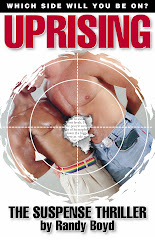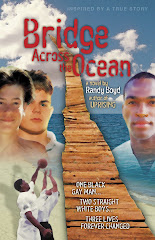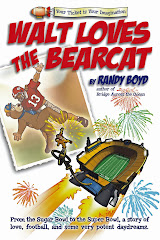 "My Gay Agenda" originally appeared in the Summer 2000 issue of The Gay & Lesbian Review Worldwide, a bimonthly journal of history, culture and politics (Vol. VII, No. 3).
"My Gay Agenda" originally appeared in the Summer 2000 issue of The Gay & Lesbian Review Worldwide, a bimonthly journal of history, culture and politics (Vol. VII, No. 3).My Gay Agenda
by Randy Boyd
I am gay and I have an agenda.
That baby-faced man who fronts that ultra-conservative political group and is always appearing
 on CNN or that blonde radio host who’s giving real doctors a bad name or any number of other right-winged pundits might conclude then that I have a gay agenda.
on CNN or that blonde radio host who’s giving real doctors a bad name or any number of other right-winged pundits might conclude then that I have a gay agenda.Fine with me.
My gay agenda is simple: be myself, wherever I go, no matter whom I’m around, whatever the circumstances. Lock, stock and barrel. All of me, including the parts that are gay and HIV positive. Yes, Ralph, Laura, Pat, George W., I admit it: I want to expose as many people as possible, age 9 months to 99 years, to the male homosexual.
The results are twofold: my soul is infinitely happier being completely free, and in my experience, exposure is the best combatant to the ignorance that is homophobia. And as fate would have it, people approach me, practically begging to be exposed to the male homosexual almost every single day of my life.
The reason is simple: at superficial glance, many people assume I’m some sort of athlete.
 Perhaps that’s because they see my skin color (black), my body (six-foot four, two hundred plus pounds), my voice (deep when I wanna be) and think stereotypically: current or former athlete. If I had a T cell for every time I’m asked: “Are you an athlete?” or “You play pro ball?”
Perhaps that’s because they see my skin color (black), my body (six-foot four, two hundred plus pounds), my voice (deep when I wanna be) and think stereotypically: current or former athlete. If I had a T cell for every time I’m asked: “Are you an athlete?” or “You play pro ball?”It happens at airports, on the beach where I live, at sporting events, at the supermarket. Minutes before the most recent Super Bowl, I was in the grocery store stocking up for the day, when a man in a wheelchair wheeled by me and said, “Aren’t you supposed to be in Atlanta warming up for the kickoff?”
Supposed to be.
People think that a black man who fits my casting description is supposed to be warming up for Super Bowls or shooting jump shots in the NBA, and so I couldn’t possibly be gay … could I? This assumption allows me a unique kind of free pass into people’s lives, and often times, because I’m openly gay, I’m afforded a unique opportunity to bust up an assumption or two.
I can usually spot the assumers pretty easily and right away. It’s the look in people’s eyes. Is he
 an athlete? Should I recognize him? He must be somebody. If they don’t ask up front, they usually work it into the conversation, the easiest non-direct way being, “what do you do for a living?”
an athlete? Should I recognize him? He must be somebody. If they don’t ask up front, they usually work it into the conversation, the easiest non-direct way being, “what do you do for a living?”“I’m a writer.”
Eyes light up. “Really, what do you write?”
“Gay fiction.”
“Really.”
Being a writer living on a beach full of mostly young white students or settled white hetereo couples, I get the “what do you do?” line all the time. I also get it when I fly first class, which I do a lot simply because my mom taught me how to work the airlines (something she learned flying me back and forth from California to Indiana when I was in college).
To be sure, not every one approaches me with such assumptions and curiosity, but enough people do approach that my world seems out of whack if it doesn’t happen several times in any given week. Sometimes it feels like a burden. Other times, most of the time, I see it as a way to
 help the next generation of black gay men (and all gay people) face a few less assumptions. How do I do this? Easy. Just follow The Script.
help the next generation of black gay men (and all gay people) face a few less assumptions. How do I do this? Easy. Just follow The Script.“What do you do?”
“I’m a writer.”
Eyes light up. “Really, what do you write?”
“Gay fiction.”
“Really.”
I’ve come out to countless strangers, acquaintances and neighbors this way. The reactions are varied, some immediate and forthcoming, others less obvious, as if I’ve planted a seed to be dealt with later. I’m sure the latter was the case during one particular first class flight. An older white man sat next to me and it wasn’t long before he came at me with his own version of The Script.
“Are you an athlete? No, then what do you do? Oh, really, what do you write about?”
“My experiences as a black gay man living with AIDS.”
I don’t think he said much to me after that (thank goodness, it was a red-eye and I’m not one for idle chatter on flights), but if he’s got an ounce of sense, he’ll think twice before making
 assumptions about the next athletic-looking black man he approaches. Or the next person he stereotypes as gay or with AIDS.
assumptions about the next athletic-looking black man he approaches. Or the next person he stereotypes as gay or with AIDS.Walking my dog, a lab mix named Boomer, also provides plenty of opportunities for people to ask about my life and for me to be completely honest. Boomer has developed several regular playmates along the beach, and as most any dog owner knows, canine playmates are a very good thing if you want to have a well-exercised (read: tired) dog and therefore a peaceful evening.
Several times a week, Boomer plays with his pals Skylar, Smoky, Bailey, Maverick, Freckles and Ollie.
While the dogs are running around being dogs, us owners have little else to do but talk, sometimes having to come up with up to an hour of conversation twice a day, seven days a week. Usually we swap anecdotal dog stories and commiserate about the joys and frustrations of basing so much of our schedule around our pets. This inevitably leads to talk of occupation, which inevitably leads me to coming out while our dogs are chasing tennis balls, playing tug of war or cataloging the scents of the other dogs’ butts.
After hearing that I wrote gay fiction, Skylar’s “mom” confided in me that her father was gay and died of AIDS. Now her and her live-in boyfriend and I talk freely about our personal lives, my homosexuality as much a non-issue as their heterosexuality.
Smoky’s “mom” and “dad” are a slightly different story. The “mom” found out I wrote gay fiction early on, but to my surprise, she must have not told her husband. The reason I concluded this was because the husband caught me off guard a few times with his homophobic reaction to our male dogs humping each other.
“Smoky, what are you doing? This isn’t San Francisco!”
Eventually, she must have told him. After a few weeks of these kinds of puerile remarks, he
 abruptly followed up one comment with: “Not that there’s anything wrong with gay people.” Eventually he asked me what kind of writing I did, perhaps feeling his wife had heard me wrong. Since confirming that indeed I do write gay fiction, I haven’t heard one disparaging comparison between dogs humping dogs and men humping men.
abruptly followed up one comment with: “Not that there’s anything wrong with gay people.” Eventually he asked me what kind of writing I did, perhaps feeling his wife had heard me wrong. Since confirming that indeed I do write gay fiction, I haven’t heard one disparaging comparison between dogs humping dogs and men humping men.Another character in my colorful life at the beach, Nicole, a waitress at a sidewalk café, loves Boomer to the point of neglecting her other tables when we’re there. Midway through the first time she waited on me, she blurted: “Now I know you play a professional sport, which is it, basketball or football?”
Cue The Script.
Cue the waitress’s shock.
After she put her eyes back in her sockets, she went on to tell me how she and her mother were reading fanatics and promised to buy my novel, Uprising, a suspense thriller with mostly gay characters and graphic descriptions of gay sex. Sure enough, next time I was at the café, her mother had finished my novel, said she’d thoroughly enjoyed it and was passing it on to Nicole.
It’s these kinds of incidents that remind me of the line of thinking that believes: if everyone in
 the world who was gay came out, the walls of ignorance would have to come crumbling down.
the world who was gay came out, the walls of ignorance would have to come crumbling down.Every time I come out, I know I’m putting another face on homosexuality. I’m busting up assumptions. I’m forcing people to rethink what they think they know.
I once worked in a mostly straight office setting. Once I came out, the complexion of the entire office changed, loosened up, dare I say. The other closeted gay man in the department, whom many assumed to be gay, came out shortly thereafter and confirmed everyone’s suspicions, strengthening his relationship with several female co-workers. The recent collage grad that was my cubicle-mate confided in me she suspected that her mother and her mother’s longtime female friend were more than roomies.
This was the first time she’d verbalized it to anyone, which allowed her to take the next step and have a talk with her mother, their honesty about the situation (yes, it was true) leading to a much better, healthier mother-daughter relationship. Another co-worker, a fellow who one could easily stereotype as a chauvinistic swinging single, put an immediate halt to the incessant homophobic
 jokes he polluted the workspace with on a daily basis. At least in this case, it was much harder to joke about homosexuality when the face of it was around, out and proud.
jokes he polluted the workspace with on a daily basis. At least in this case, it was much harder to joke about homosexuality when the face of it was around, out and proud.These kinds of experiences are more evidence to me that straight people need to be exposed to gay people and that exposure serves as a powerful bomb on ignorance. And the trickle down effect is more much effective than Reaganomics ever was. My best male friend is straight and someone I met at the gym, our friendship taking off once I was honest with him about something he suspected: I was gay and attracted to him. Now his large Latino family is like my extended family and they all know I’m gay, from the school-age children to the aunts and uncles.
The younger children found out I was gay and HIV positive after they’d known me for a few years. We sat them down and had a talk. After clearing up some of the misconceptions they’d heard about gays and AIDS from their elementary schoolmates, they decided that they don’t view me any differently. I still get hugs, still make them laugh and still feel their love.
I found my best female friend when I was riding the stationary bike at the gym and overheard a
 beautiful California blonde woman telling her male friend, “I might move in with these gay guys, but I don’t know. You know how gay guys are so bitchy.”
beautiful California blonde woman telling her male friend, “I might move in with these gay guys, but I don’t know. You know how gay guys are so bitchy.”“Not all of us,” I said. She was shocked and embarrassed. Her fumbling apology turned into an intimate conversation. Over a decade later, we’re as tight as soul mates. We are soul mates.
Once, while working out at the gym, I met a fifteen year-old boy who had just arrived from Russia and barely spoke English. He aspired to “get big” like me and wanted to worked out with me whenever he saw me. Eventually he asked what I did for a living and we ran through The Script. I tried to explain what gay meant, but he didn’t understand until finally he translated it into the only English word he could:
“You mean fag?”
It was a word he’d learned in the few short weeks he’d been enrolled in an American high school.
 When I confirmed that I was a fag, but the word wasn’t exactly flattering, his blue eyes widened with a trace of fear. But that didn’t stop him from wanting to work out with me and being a good gym-friend. I also noticed he used “gay” instead of “fag” from then on.
When I confirmed that I was a fag, but the word wasn’t exactly flattering, his blue eyes widened with a trace of fear. But that didn’t stop him from wanting to work out with me and being a good gym-friend. I also noticed he used “gay” instead of “fag” from then on.Clearly, telling people I’m gay, no matter how it comes about, has opened up a world for me and the many straight people who have chosen to be open-minded. One of the more crystal examples of this was a beautiful experience that became the inspiration for my new novel, Bridge Across the Ocean. Shortly after testing positive in 1988, I took off for a breather in Cancun, Mexico.
Once there, I met two white teenage brothers who—surprise!—thought I was a black pro athlete when they first saw me. We ended up spending just about every waking moment of the entire week together, and by the time it was over, their assumptions about me and themselves were challenged in ways that changed all our lives.
It was their first exposure to a black person, a gay person and eventually, a person who was HIV
 positive. Their parents were at polar opposites on whether or not I should be in their sons’ lives. The dad was homophobic and racist. The mom much more tolerant, but still leery because she knew I was attracted to the older son. Ultimately, the sons had to make their own choices about the black gay man they became friends with in Cancun, their decisions based on their own experience coupled with what they’d been taught by their parents and the world.
positive. Their parents were at polar opposites on whether or not I should be in their sons’ lives. The dad was homophobic and racist. The mom much more tolerant, but still leery because she knew I was attracted to the older son. Ultimately, the sons had to make their own choices about the black gay man they became friends with in Cancun, their decisions based on their own experience coupled with what they’d been taught by their parents and the world.I don’t want to give away the story, but I will say Bridge Across the Ocean supports my theory that, for straight people who get to know gay people, interact with gay people, share with gay people, live with gay people, it’s almost impossible to be homophobic, which is why, even though there are times when I just want to be a regular guy with a regular job and nothing controversial about me, I know I must make the most of being black and gay and HIV positive.
To be sure, not everyone I’ve ever told I’m gay or HIV positive has been open-minded, and being
 this out and proud is not right for everyone in every situation. There are plenty of bashers out there and I myself have been accosted for being me (in Amsterdam, of all places).
this out and proud is not right for everyone in every situation. There are plenty of bashers out there and I myself have been accosted for being me (in Amsterdam, of all places).And I have to admit: sometimes I get tired of the fight, of telling someone I write gay fiction, of having them only see me as GAY or with AIDS and not any of the other wonderful, diverse things that make up who I am. But then something happens in the world to re-ignite my will to live freely and I know I have an obligation to my soul to be me, hidden from no one. Deep in my heart, I know it’s going to help make some confused kid’s journey a little easier. Deep in my heart, I know it’s going to make my journey a lot easier.
Originally appeared in the Summer 2000 issue of The Gay & Lesbian Review Worldwide, a bimonthly journal of history, culture and politics (Volume VII, Number 3).














